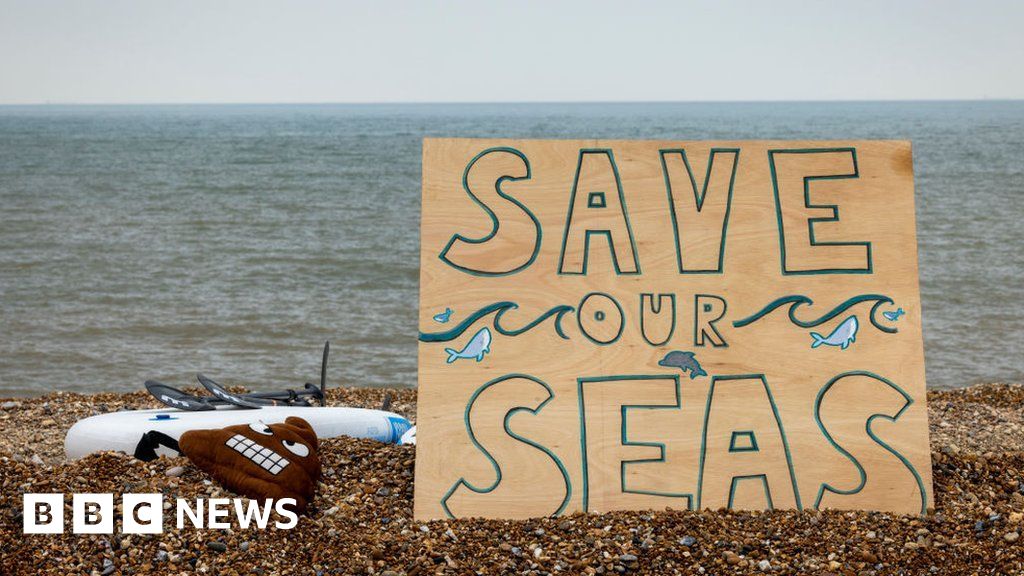Science
England Faces Record Sewage Spills into Rivers and Seas

Water companies in England discharged raw sewage for a record total of 3.61 million hours into rivers and seas during 2024, according to data from the Environment Agency. This figure marks a slight increase from 3.606 million hours in 2023, although the overall number of incidents has decreased. The duration of each spill has lengthened, raising alarms among environmental groups regarding the impact on wildlife and public health.
The increase in sewage spills reflects the challenges posed by the combined sewerage system prevalent in much of the UK, which transports both rainwater and wastewater through the same pipes. When heavy rainfall occurs, especially on dry ground where water cannot be absorbed quickly, the system can become overwhelmed. This leads to the discharge of excess wastewater into natural water bodies via combined sewer overflows (CSOs).
According to the Environment Agency, there were 75 serious pollution incidents in 2024, posing risks to aquatic and human health. Notably, Thames Water was responsible for 33 of these incidents. Critics argue that the industry must improve its management practices to prevent such occurrences.
In response to growing concerns, Water UK, the body representing sewerage companies, stated that sewage spills are “unacceptable.” The organization announced plans to end these discharges into waterways through significant infrastructure upgrades. Over the next five years, a total of £104 billion will be allocated for improvements, with £20 billion specifically aimed at addressing sewage spills.
Despite these commitments, environmental advocates have raised concerns about rising water bills for consumers while water companies continue to distribute dividends to shareholders. The Labour Government, which came to power in Summer 2024, has initiated policies to tackle the issue. In May 2024, a panel of experts warned of increasing public health risks from contamination in rivers and called for more frequent testing.
The presence of sewage can expose individuals to harmful bacteria such as salmonella and E. coli or viruses like hepatitis A. The Environment Agency conducts weekly water quality assessments at bathing sites from May to September, providing daily pollution risk forecasts in certain areas. Additionally, there are ongoing discussions about extending the bathing season to facilitate year-round testing.
The monitoring of sewage spills has only been routine for a few years, complicating efforts to assess trends over time. However, overall water quality has been evaluated for decades, indicating that only 16% of assessed surface waters in England achieved “good” ecological status as of May 2023. In comparison, around two-thirds of surface waters in Scotland and 40% in Wales meet this standard.
In an effort to enhance transparency, Water UK launched the National Storm Overflow Hub, which provides near-real-time data on discharges across England’s overflow points. Nevertheless, this platform lacks information on the volume of sewage released or the presence of harmful organisms in the water.
As the situation evolves, the spotlight remains on how effectively water companies will implement infrastructure improvements and address the critical public health concerns associated with sewage spills. The actions taken in the coming years will have lasting implications for environmental safety and public health across England.
-

 World2 weeks ago
World2 weeks agoCoronation Street’s Shocking Murder Twist Reveals Family Secrets
-

 Entertainment1 week ago
Entertainment1 week agoAndrew Pierce Confirms Departure from ITV’s Good Morning Britain
-

 Entertainment5 months ago
Entertainment5 months agoKate Garraway Sells £2 Million Home Amid Financial Struggles
-

 Entertainment4 months ago
Entertainment4 months agoAnn Ming Reflects on ITV’s ‘I Fought the Law’ Drama
-

 Entertainment1 month ago
Entertainment1 month agoCoronation Street Fans React as Todd Faces Heartbreaking Choice
-

 Health4 months ago
Health4 months agoKatie Price Faces New Health Concerns After Cancer Symptoms Resurface
-

 World1 month ago
World1 month agoBailey Announces Heartbreaking Split from Rebecca After Reunion
-

 Entertainment2 weeks ago
Entertainment2 weeks agoTwo Stars Evicted from I’m A Celebrity Just Days Before Finale
-

 World2 weeks ago
World2 weeks agoKevin Sinfield Exceeds Fundraising Goal Ahead of Final Marathons
-

 Entertainment4 months ago
Entertainment4 months agoCoronation Street’s Carl Webster Faces Trouble with New Affairs
-

 Entertainment3 months ago
Entertainment3 months agoWhere is Tinder Swindler Simon Leviev? Latest Updates Revealed
-

 Entertainment5 months ago
Entertainment5 months agoMarkiplier Addresses AI Controversy During Livestream Response





















